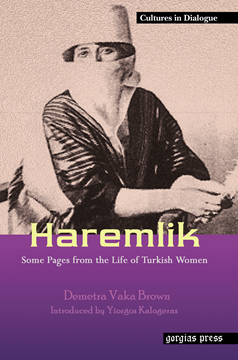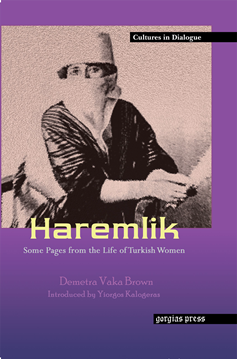Demetra Vaka Brown
The Unveiled Ladies of Istanbul (Stamboul) (Paperback)
Series: Cultures in Dialogue: First Series 13
ISBN: 978-1-59333-217-4
The Unveiled Ladies of Istanbul (Stamboul) is a picturesque description of women's life in post-World War I Turkey during a period of social and political turmoil. Here Demetra Vaka (1877-1946), an expatriate of Ottoman Turkey, established American journalist and acquaintance of Prince Sabaheddin, returns to her native Istanbul after a 20-year absence. Describing women's lives in post-World War I Turkey, she reports on the successful project of female emancipation pursued by Mustafa Kemal as part of the nationalist agenda. Noting how much this project had benefited upper- and middle-class Turkish women, Vaka nonetheless regrets that the gradual emergence of the monocultural, modern Republic was bringing an end to the multiethnic character of the Ottoman State.
$116.00 (USD) $69.60 (USD)
Some Pages from the Life of Turkish Women (Paperback)
New Introduction by Yiorgos Kalogeras
Series: Cultures in Dialogue: First Series 2
ISBN: 1-59333-308-0
Born as a Greek Ottoman in Istanbul, Demetra Vaka Brown (1877-1946) moved to America where she became a journalist and novelist, revisiting Turkey to write several books about the twilight of the Ottoman Empire and the emergence of the Turkish Republic. She based this, her first book, on experiences from 1901, when modernization had made inroads into Ottoman domestic life and the harem was becoming a thing of the past. Her reflections on life in the harem suggest the conflicted nature of her allegiances: Vaka is nostalgic for the Ottoman life that was rapidly disappearing, but she also enjoys the freedoms of a professional American woman.
$106.00 (USD) $63.60 (USD)
The Unveiled Ladies of Istanbul (Stamboul) (Hardback)
New Introduction by Yiorgos Kalogeras
Series: Cultures in Dialogue: First Series 13
ISBN: 1-59333-216-5
The Unveiled Ladies of Istanbul (Stamboul) is a picturesque description of women's life in post-World War I Turkey during a period of social and political turmoil. Here Demetra Vaka (1877-1946), an expatriate of Ottoman Turkey, established American journalist and acquaintance of Prince Sabaheddin, returns to her native Istanbul after a 20-year absence. Describing women's lives in post-World War I Turkey, she reports on the successful project of female emancipation pursued by Mustafa Kemal as part of the nationalist agenda. Noting how much this project had benefited upper- and middle-class Turkish women, Vaka nonetheless regrets that the gradual emergence of the monocultural, modern Republic was bringing an end to the multiethnic character of the Ottoman State.
$171.00 (USD) $102.60 (USD)
Some Pages from the Life of Turkish Women (Hardback)
New Introduction by Yiorgos Kalogeras
Series: Cultures in Dialogue: First Series 2
ISBN: 1-59333-203-3
Born as a Greek Ottoman in Istanbul, Demetra Vaka Brown (1877-1946) moved to America where she became a journalist and novelist, revisiting Turkey to write several books about the twilight of the Ottoman Empire and the emergence of the Turkish Republic. She based this, her first book, on experiences from 1901, when modernization had made inroads into Ottoman domestic life and the harem was becoming a thing of the past. Her reflections on life in the harem suggest the conflicted nature of her allegiances: Vaka is nostalgic for the Ottoman life that was rapidly disappearing, but she also enjoys the freedoms of a professional American woman.
$161.00 (USD) $96.60 (USD)



